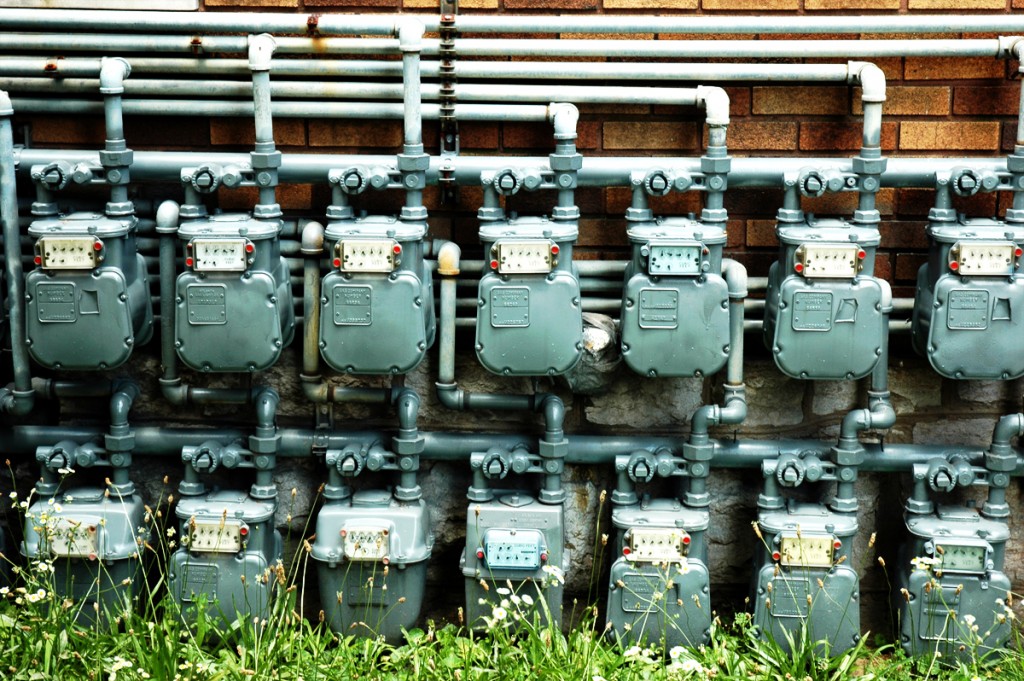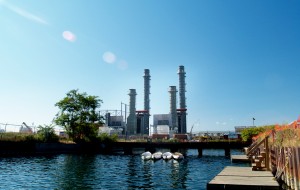Ontario climate change plan raises home heating questions

Gas meters. An endangered species in Ontario? Photo: Mark Strozier, Creative Commons, some rights reserved
It’s a gas leak of a different kind. Recently, a copy of the Ontario government’s climate change action plan was leaked to the media. The big controversy in the document is a suggestion that home heating with natural gas and oil will be phased out and no longer permitted in new homes after 2030 in order to reduce greenhouse gas emissions. Even though that’s 14 years away, even the slightest suggestion of no longer having gas as a heating option is getting a pretty cool reception from many Ontario residents. For decades, many Ontario homeowners have been switching to gas and getting rid of oil because of the lower cost, higher efficiency, and abundant supply. Residents and councils in towns without connections to gas pipelines still lobby gas companies and energy regulators to expand to their communities. The provincial government is ironically even attempting to expand the natural gas industry through economic development programs.
Due to regulatory changes and renewable generation policies over the past 20 years, Ontario’s electricity rates have gone from among the lowest in Canada, to the highest. Homeowners aren’t exactly eager to start heating their houses with electricity because of that. It’s totally opposite from the 1980s when Ontario Hydro ran a TV advertising campaign with a talking oil furnace named Fillmore (as in, fill with more oil), encouraging people to turf their oil-thirsty furnace and “Go Electric.” Of course in much of rural and northern Ontario, good old fashioned wood is still the fuel of choice for many homeowners during the winter months. They either cut it on their own properties or buy it from a nearby supplier. Some heat with wood and oil combination furnaces and try to use as much wood as possible to keep oil costs down. “Getting the wood in”—which usually means stacking it in a basement or shed, is a late summer ritual for many rural Ontarians.

Glen Murray (middle), Ontario’s Minister of Environment and Climate Change, with his Quebec and B.C. counterparts at a climate conference in Lima, Peru. Photo: Province of British Columbia
Opposition politicians in the legislature have loudly criticized the government’s plan, saying it will end up being a huge financial burden on residents and homebuilders alike. Home heating is a pretty important thing in Ontario. Depending on the weather, it’s not unusual to have the furnace turned on from October to April. Environment and Climate Change Minister Glen Murray has shifted into political damage control gear and will not deny the report exists, but says the government is not trying to eliminate natural gas as a heating source. Premier Kathleen Wynne has also insisted that natural gas will not be outlawed. With political leadership saying one thing, and a policy plan saying another, Ontario residents are wondering exactly what is going on and what the government is planning to do.
Ironically, Canada’s oil and gas industry started in Ontario back in 1858 with the discovery of oil in the southwestern part of the province, a year before Colonel Edwin Drake struck oil in Titusville, Pennsylvania, leading to the beginnings of John D. Rockefeller’s fortune. Although it is far from a big producer, there are still over 2,400 working oil and gas wells in Ontario, mostly in the southwest. Union Gas, now owned by Houston-based Spectra Energy, has its head office in Chatham. Companies like it, and those small wells at the corners of farm fields along rural roads, exist mostly to provide heat to homes. What is their future if their product can no longer be used for that?

Recently-built natural gas plant in Toronto. Photo: Viv Lynch, Creative Commons, some rights reserved
Gas seems to be a recurring source of pain for the Ontario government. Before the current controversy started, there was the scandal over the Liberal cabinet cancelling the construction of two gas-fired power generating stations in the Toronto area during the 2011 election campaign. The power plants were unpopular with local residents and Liberal legislators representing the areas around them were facing defeat. The cancellation was seen as an expensive political move because it led to $950 million in penalties the government had to pay to construction companies who had already started building the plants. Back in the 1950s, three cabinet members of the Conservative government at the time, along with a provincial Supreme Court judge got into trouble for speculating—and profiting on stock in a natural gas company in northern Ontario. As for the present day climate change plan and the questions it raises of how future Ontario residents will keep themselves warm during the winter, the government says full details and explanation of exactly what it wants to do will be released officially in the weeks and months ahead.
Tags: electricity, energy, environment, gas, heating, oil, Ontario








Hey, don’t worry about energy so much. There is a package of chipper, sustainable and cleaner energy together with a clean vehicle and power storage is offered by a single innovation which is demonstrated in the following link. http://www.patentsencyclopedia.com/app/20160123301
It just needs to be funded and send it to the marketplace. So, the mission of oil companies are fighting hard against funding this innovation and they were successful up to now. “Is there anybody out there?”
Here is an idea. All government buildings and employees must use dried Moose and Bear droppings for heat and cooking. A renewable source of fuel that is sure to save the planet.
Not a Canadian, so not my problem.
But one of the big problems with all governments is their attempts to control all aspects of your life.
How you heat your house should be decided by you, not the government.
This is no different than you deciding what you want to buy and what you don’t want to buy.
And just to be a bit snarky, everyone should have the right to belong or not belong to any religion and this includes not joining the New Age religion best known as Climate Change.
Funny how it is set to coincide with the 2030 Maunder minimum “Mini Ice Age”.
http://www.dailymail.co.uk/sciencetech/article-3156594/Is-mini-ICE-AGE-way-Scientists-warn-sun-sleep-2020-cause-temperatures-plummet.html
https://astronomynow.com/2015/07/17/diminishing-solar-activity-may-bring-new-ice-age-by-2030/
http://phys.org/news/2011-07-ten-chance-colder-uk-winters.html
It’s as if their government wants them to freeze to death.
Ontario voters are getting what they voted for. Like us in the USA, they elect idiots then they’re stuck living with the consequences.
Good luck getting Canadians on board with this nonsense. It’s pretty well known that in a country with strict gun regulations, rural Canadians just don’t bother registering their guns. They still own them – with bear, moose and game meat in abundance you pretty well have to – they just don’t tell the gubmint about it. And common sense will prevail when those solar panels and windmills just don’t cut it during -50 temps in mid-January. The wood burner will be stacked and ready to go, and there will be a few propane heaters running as well. The result of this government foolishness will be MORE reliance on carbon-based fuels, not less.
It’s true, our gun regulations are more strict than in the US, but “long guns” (shotguns and most rifles) no longer have to be registered. The issue of registering long guns was what caused so much controversy for nearly 20 years. Moose and bear are not abundant everywhere in Canada. They are almost never seen in parts of southern Ontario or the prairie provinces. Most Canadians do their hunting at the supermarket.
CO2=Y2K² Who’s the redneck in the history books?
Global denial has prevented climate action for 35 years because science refuses to say their CO2 crisis is as real as they say smoking causes cancer.
Are the science gods you exaggerate also only 99% sure the planet isn’t flat?